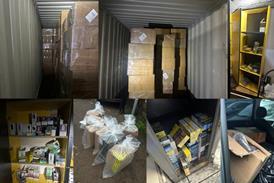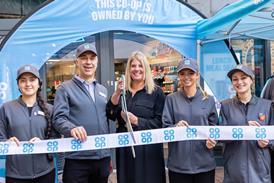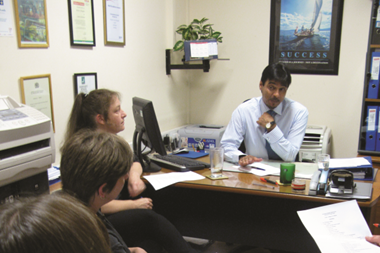How do some of our C-Store Champs go about training staff?
Sunder Sandher: All my staff have their NVQs updated every two years. This is all government funded and done in the store, which keeps disruption to a minimum.
Tony Scott: I have to admit to being a late convert to a formal training programme, having taken quite an
ad hoc approach to training in the past. However, we're now in the process of using specific programmes and methods suggested by Musgrave Retail Partners.
Tim Lake: All my training is done in-house by myself or my wife, Carey. We use a scheme run by Trading Standards which I find particularly effective. They send us training booklets each time a new member of staff joins. These cover all aspects of retailing, from merchandising to the latest legislation. We go through the booklet with them as they learn on the job.
Steve Bassett: My staff take a variety of courses in different subjects, from selling age-restricted goods to hygiene and merchandising. A trainer from Musgrave Retail Partners comes to the store on a regular basis to help us with this. It works well as staff can learn on the job. In the past I have clubbed together with another independent retailer to conduct training as it works out a lot cheaper that way.
SS: To formalise a programme I write down all the person's job duties and then fine-tune them with the staff training. Support is received from Investors In People and Business Link. I am also an NVQ assessor, which is a huge advantage.
TS: The programmes that I use are from Budgens, and Kirsty Crowe, retail training manager at Musgrave Retail Partners, supports us wonderfully with them.
TL: There is a questionnaire at the end of each booklet which my staff complete and then send back to Trading Standards for marking. They then get back to us with the results and offer us all sorts of advice.
SB: Every new starter has to watch an induction DVD which teaches them all the basic things that they need to know before they start. It speeds up the whole process and saves me time. Musgrave Retail Partners are also very supportive with the process.
SS: It's an ongoing process, so it's difficult to quantify. In this job you learn new things every day, even at my level. I'm lucky that I've got some excellent managers who help me to take care of it.
TS: Training is an ongoing procedure, involving different staff members and different tasks. It involves input - however small -almost two or three times a week.
TL: The retail industry is so fast paced that there's always something new to learn. At the very least I spend about an hour a week training a particular member of staff. I employ 15 people so training takes up a significant chunk of my time, but it's worth it.
SB: It's very time consuming, especially when you have a new starter, but it's worth every minute spent on it. All staff receive a re-cap on selling age-restricted goods twice a year as this is such an important part of
c-store retailing these days.
SS: I have five stages. Stage one is basic retailing, and five is management level. Staff are put at the selected stage and then trained to move upwards. This process also allows us to keep an eye on staff progress.
TS: All tasks are monitored and staff member records are updated on a regular basis.
TL: I check progress by watching what they do on the job, and also using the Trading Standards booklets that we receive. We try to go through the booklets with each staff member once every three months to keep them on the ball.
SB: I do it by watching and listening. We also have training DVDs which have test questions at the end of them to check on understanding.
SS: Praising staff when they do something well is very important. So too is asking for their ideas, and when they are good, taking them on board. It's really satisfying for staff to see that they are being taken seriously, and that their ideas count.
TS: Staff respond well to the fact that you are spending time with them.
TL: By treating them with respect. If you show respect to your staff they will respect you, and will want to do their best to help you.
SB: I don't find that I have to motivate my staff, as the majority enjoy their training. They like learning something new and interesting.
SS: Staff training is like investing in your business; if your investment is poor you will get poor results.
TS: As well as creating greater
efficiency, staff training creates a sense of belonging, and as a result staff feel confident and happier in what they do. This in turn filters through to the customer, so it's a real win-win situation.
TL: Training is vital. If your staff don't know what they are doing, you could easily lose your liquor licence, or even your livelihood. You can never invest too much in training your staff.
SB: Three reasons: It improves staff morale as employees feel more confident; it protects my business; and it increases my profits.
What kind of staff training do you offer?
Sunder Sandher: All my staff have their NVQs updated every two years. This is all government funded and done in the store, which keeps disruption to a minimum.
Tony Scott: I have to admit to being a late convert to a formal training programme, having taken quite an
ad hoc approach to training in the past. However, we're now in the process of using specific programmes and methods suggested by Musgrave Retail Partners.
Tim Lake: All my training is done in-house by myself or my wife, Carey. We use a scheme run by Trading Standards which I find particularly effective. They send us training booklets each time a new member of staff joins. These cover all aspects of retailing, from merchandising to the latest legislation. We go through the booklet with them as they learn on the job.
Steve Bassett: My staff take a variety of courses in different subjects, from selling age-restricted goods to hygiene and merchandising. A trainer from Musgrave Retail Partners comes to the store on a regular basis to help us with this. It works well as staff can learn on the job. In the past I have clubbed together with another independent retailer to conduct training as it works out a lot cheaper that way.
How do you formalise the programme and do you receive any support?
SS: To formalise a programme I write down all the person's job duties and then fine-tune them with the staff training. Support is received from Investors In People and Business Link. I am also an NVQ assessor, which is a huge advantage.
TS: The programmes that I use are from Budgens, and Kirsty Crowe, retail training manager at Musgrave Retail Partners, supports us wonderfully with them.
TL: There is a questionnaire at the end of each booklet which my staff complete and then send back to Trading Standards for marking. They then get back to us with the results and offer us all sorts of advice.
SB: Every new starter has to watch an induction DVD which teaches them all the basic things that they need to know before they start. It speeds up the whole process and saves me time. Musgrave Retail Partners are also very supportive with the process.
How much of your time does staff training take up?
SS: It's an ongoing process, so it's difficult to quantify. In this job you learn new things every day, even at my level. I'm lucky that I've got some excellent managers who help me to take care of it.
TS: Training is an ongoing procedure, involving different staff members and different tasks. It involves input - however small -almost two or three times a week.
TL: The retail industry is so fast paced that there's always something new to learn. At the very least I spend about an hour a week training a particular member of staff. I employ 15 people so training takes up a significant chunk of my time, but it's worth it.
SB: It's very time consuming, especially when you have a new starter, but it's worth every minute spent on it. All staff receive a re-cap on selling age-restricted goods twice a year as this is such an important part of
c-store retailing these days.
How do you check staff progress?
SS: I have five stages. Stage one is basic retailing, and five is management level. Staff are put at the selected stage and then trained to move upwards. This process also allows us to keep an eye on staff progress.
TS: All tasks are monitored and staff member records are updated on a regular basis.
TL: I check progress by watching what they do on the job, and also using the Trading Standards booklets that we receive. We try to go through the booklets with each staff member once every three months to keep them on the ball.
SB: I do it by watching and listening. We also have training DVDs which have test questions at the end of them to check on understanding.
How do you motivate staff to take part?
SS: Praising staff when they do something well is very important. So too is asking for their ideas, and when they are good, taking them on board. It's really satisfying for staff to see that they are being taken seriously, and that their ideas count.
TS: Staff respond well to the fact that you are spending time with them.
TL: By treating them with respect. If you show respect to your staff they will respect you, and will want to do their best to help you.
SB: I don't find that I have to motivate my staff, as the majority enjoy their training. They like learning something new and interesting.
Why is staff training so important?
SS: Staff training is like investing in your business; if your investment is poor you will get poor results.
TS: As well as creating greater
efficiency, staff training creates a sense of belonging, and as a result staff feel confident and happier in what they do. This in turn filters through to the customer, so it's a real win-win situation.
TL: Training is vital. If your staff don't know what they are doing, you could easily lose your liquor licence, or even your livelihood. You can never invest too much in training your staff.
SB: Three reasons: It improves staff morale as employees feel more confident; it protects my business; and it increases my profits.




























No comments yet